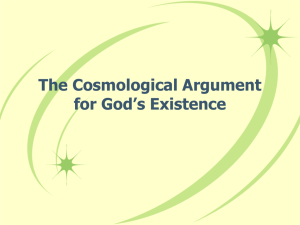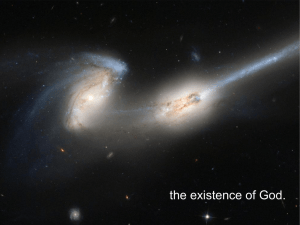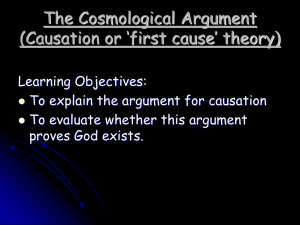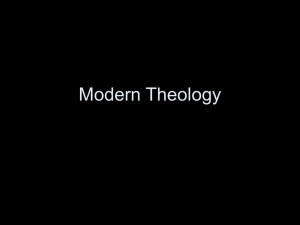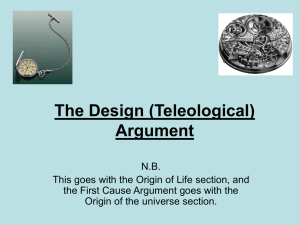The Existence of God
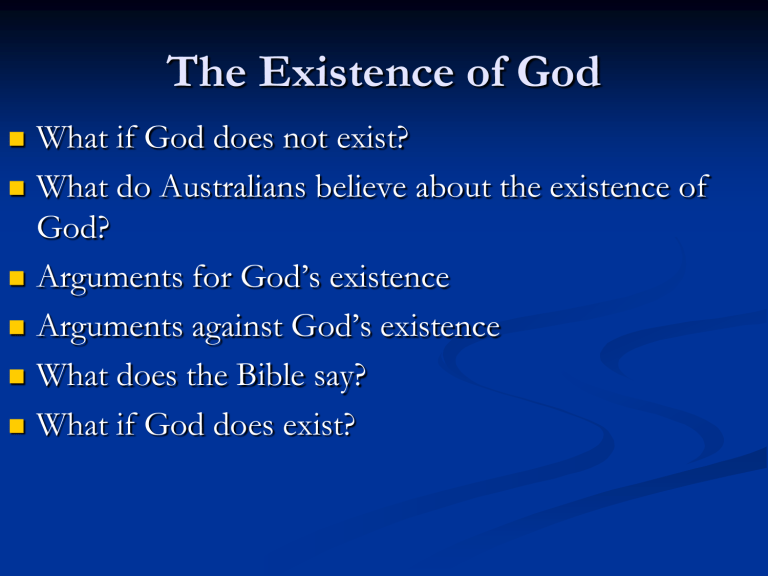
The Existence of God
What if God does not exist?
What do Australians believe about the existence of
God?
Arguments for God’s existence
Arguments against God’s existence
What does the Bible say?
What if God does exist?
What if God does not exist?
Reasons people may want God not to exist:
Desire to control our own destiny
Construct our own ethics
Not be accountable to a higher authority
Sexual freedom
Live to please ourselves
Apathy
What if God does not exist?
For Everyone:
When we die everything comes to nothing
Ultimately no meaning, no goals, no values
For the Christian:
Wasting our time here
Prayer is speaking to ourselves
At best a harmless delusion
We of all people are most to be pitied
Eat drink and be merry, for tomorrow we die
What do Australians believe?
World Values Survey - Belief in God
Atheist 5.3%
Agnostic 15.0%
Theist 79.7%
What do Australians believe?
Belief in a “God” is surprisingly high
Atheism is quite rare
Could be a “God” of any sort
Other statistics:
About 50% identify themselves as religious
10% to 20% attend church regularly
Only a minority are specifically Christian
Arguments for the existence of God
(Natural Theology)
Cosmological argument
Teleological argument
Moral argument
Ontological argument
Cosmological Argument
Cosmos means the universe or the world
Who made the universe?
Also called the “first cause” argument
Many forms
Kalam Cosmological Argument
2.
3.
1.
Everything that begins to exist has a cause
The universe began to exist
Therefore the universe has a cause
Kalam Cosmological Argument
“Kalam” is Arabic for “speech”
Muslim thinkers : Al-Ghazali (1058-1111)
Premise 1 considered intuitively obvious
(Everything that begins to exist has a cause)
Most effort went into justifying premise 2
(The universe began to exist)
Historically atheists have claimed that the universe is eternal and uncaused
Al-Ghazali argued that actual infinites cannot exist – universe must have a beginning
Cosmological Argument
Today, premise 2 is generally accepted for scientific reasons:
Second law of thermodynamics
Big Bang theory
Premise 1 (Everything that begins to exist has a cause) is challenged today
Some atheists claim the universe popped into existence uncaused out of nothing
Common Objection
If God made the universe, then who made God?
Answer:
No one. God is eternal and has no beginning. God was not made or created and is uncaused.
The argument can be stated crudely in another way:
There must be something that is eternal and uncaused
That something must be either the universe or God
It is not the universe
Therefore it must be God
Teleological Argument
Telos means purpose or goal
Also called the argument from design
Teleological Argument
In 1802 William Paley published
“Evidences of the Existence and
Attributes of the Deity”
Watchmaker analogy:
Imagine you found a watch in a field.
Would you conclude that the watch was due to chance or design?
Paley provided many examples of design in nature, such as the human eye.
Teleological Argument
Charles Darwin (1809-1882) published “On the Origin of
Species” in 1859
Many believed that this provided an explanation of how the appearance of design was due to chance
Fine Tuning
“Goldilocks Effect” - The universe is just right to permit life.
About 12 physical constants and 12 initial conditions are finely tuned to enable the universe to be life permitting
Probability that a random set of physical laws could be life permitting is vanishingly small
1 in N where N is 1 followed by 10 123 zeroes
Compare approximately 10 80 atoms in universe
Fine Tuning Argument
2.
3.
1.
The fine tuning of the constants in the laws of physics and the Big Bang initial conditions are due to
Law, Chance or Design.
The fine tuning is not due to Law or Chance.
Therefore it is due to design.
Fine Tuning Argument
Current state of play:
The universe was designed by a Designer, or
There are an infinite number of universes with random physical laws and we happen to live in a lucky one
Multiple universes cannot be observed or tested
Multi-verse must be finely tuned
We can only observe and test 1 universe
Which option is more plausible?
Moral Argument
The cosmological and teleological arguments claim that there is a Creator and Designer of the universe
Is He interested in us?
Deism: God is not interested in us
Theism: God is interested in us
Moral argument does not claim that atheists are immoral
We are all moral, but why?
Moral Argument
1.
2.
3.
Moral argument:
If God does not exist then objective moral values do not exist
Objective moral values do exist
Therefore God exists
Objective moral values: moral values are valid and binding whether people believe them or not
Relative moral values: matter of personal taste
Atheism implies that there is no basis for objective moral values.
Moral Argument
People only maintain that moral values are relative until faced with examples
Was the holocaust evil regardless of who won the war?
Is paedophilia Ok? Paedophiles think it is Ok.
Is raping babies Ok?
Most people will recoil in horror.
As soon as we admit that raping babies is objectively bad then we affirm that objective moral values do exist
Moral argument also affirms that God is interested in our values and what we do
We now affirm belief in a God who is interested in us
Ontological Argument
A completely logic argument with no reference to the external world
If it is possible that God exists, then God must exist.
Many believe it is valid, but not convincing
Craig uses this argument in debates but not covered in On Guard
Two forms:
Anselm (1033 – 1099)
Alvin Plantinga (1932 - )
Anselm’s Version
God is the greatest conceivable being
To exist is greater than to not exist.
If God does not exist then it is possible to conceive a greater being
Therefore God exists
Plantinga’s Version (simplified)
Argument:
1.
2.
3.
4.
It is possible that a Maximally Great
Perfect Being (MGPB) exists.
If it is possible that a MGPB exists then he must exist in some possible world.
If he exists in some possible world then he must exist in all possible worlds
Therefore a MGPB exists
Only premise 1 is controversial
Other Arguments
Cosmological, teleological and moral arguments affirm that there exists a God who is:
Creator
Designer
Basis for objective moral values
Applicable to all of the monotheistic religions:
Judaism,
Christianity
Islam
Two additional Christian arguments:
Historical evidence for Jesus’ resurrection
Witness of the Spirit (Christian experience)
Arguments against God’s Existence
Arguments against God’s Existence
The Problem of Evil
The Hiddenness of God
Problem of Evil
1.
2.
3.
The problem of evil can be stated :
If God exists then He would not allow pointless evil
There is pointless evil in the world
Therefore God does not exist
Impossible to prove that God does not have a purpose in allowing evil
1.
2.
3.
Argument can be rearranged as follows:
If God exists then He would not allow pointless evil
God exists (see previous arguments)
Therefore there is no evil in the world that is pointless
Proverbs 16:4 “The LORD works out everything for his own purposes; even the wicked for a day of disaster.”
Hiddenness of God
If God exists, why doesn’t He show himself?
Maybe God doesn’t show Himself because He doesn’t exist
Answer: He has shown Himself:
In nature (eg Psalm 19)
Through Israel in His word
In Jesus of Nazareth
In our Christian experience
Biblical Perspective
Psalm 19 – The heavens declare the glory of God
Romans 1:
God’s qualities revealed in what He has made
We are without excuse
We suppress the knowledge of God
The Biblical perspective is consistent with the Cosmological and
Design arguments
Two views
Two men looked out of prison bars; one saw mud and the other saw stars.
View 1: Steven Weinberg
“The more the universe seems comprehensible, the more it also seems pointless.”
View 2: Paul Davies
“Science is based on the assumption that the universe is thoroughly rational and logical at all levels. Atheists claim that the laws of nature exist reasonlessly and the universe is ultimately absurd. As a scientist, I find this hard to accept. There must be an unchanging rational ground in which the logical, orderly nature of the universe is rooted.”
What if God does Exist?
What are the implications if God does exist?
The world is not meaningless
Everything has a purpose
God has revealed His will through His word.
What if God has indeed spoken to us through His Son?
There is a purpose in our existence
God hears our prayers
God indwells His people
By faith we receive eternal life
John 11:25-26: "I am the resurrection and the life. He who believes in me will live, even though he dies; and whoever lives and believes in me will never die.”

